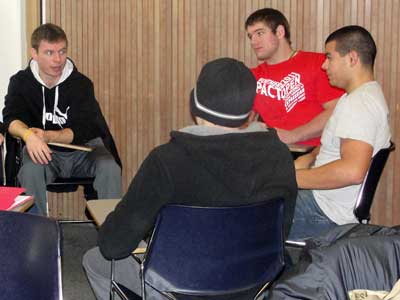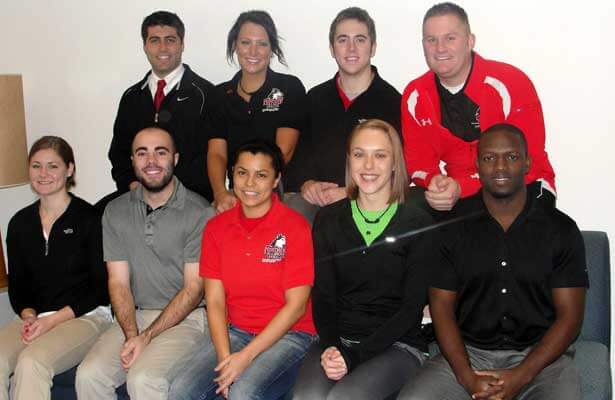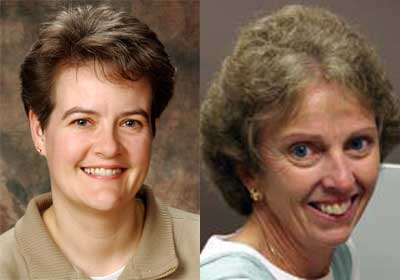It is always valuable in an unfamiliar situation to have a guide, someone who can help you get your bearings and provide guidance in making those big decisions.
While many advisers and faculty members already do this, the mentoring programs in the Department of Kinesiology and Physical Education (College of Education) and the School of Nursing and Health Studies (College of Health and Human Sciences) go the extra mile.
Both programs began two years ago and have been providing students who are new to the program with support ever since.
“They’ll get to know other students in the program,” says Sarah Knutson, a KNPE student and mentor. “They’ll be able to navigate the program easier, they’ll be provided with knowledge from a person who has been through some of the program, and they’ll have an understanding of what is expected and what is to come.”
Having a peer mentor is helpful, says Health Education student Kacey Kronforst.
“It has given me the opportunity to meet someone who has been where I am now and can let me know what I have to look forward to and what to expect.”
The mentoring programs place experienced students who are personally selected with small groups of new students who are enrolled in Introduction to Teaching Physical Education (KNPE 200) and Introduction to Health Education (PHHE 208).
KNPE mentors are selected from students in the teaching certification program who have successfully completed elementary clinicals, are actively involved in the majors club, are in good academic standing and are knowledgeable of the program as a whole. The Health Education mentors are selected from students in the program who have completed the Health Education Methods course (PHHE 400), are in good academic standing, are actively involved in the Student Health Organization (SHO) and are knowledgeable about the program.
The mission of mentoring, as stated in the mentoring handbook, is “to educate peer mentors to help students new to the program become familiar with discipline-specific resources, acclimate and navigate the major and encourage participation in social and professional development opportunities.”
After the mentors are selected, they are required to attend a training session focusing on effective mentoring and are given packets with resources for them to use throughout the mentoring relationship. The balance of the process consists of several in-class discussions, out-of-class meetings, a social gathering (such as a conference or campus activity) and a student club meeting, all complemented by the open communication and ongoing assistance that the relationship provides.
 Each meeting allows the students to interact and discuss the four pillars of the mentoring program; social skills, program navigation, academic skills and professional involvement.
Each meeting allows the students to interact and discuss the four pillars of the mentoring program; social skills, program navigation, academic skills and professional involvement.
Mentors express a wonderful passion for the program.
“Our program is taking initiative for the success of new, incoming students,” says Dave Chiros, a KNPE student and mentor. “I don’t know of many programs or schools that have a mentoring program like this, so it certainly sets us apart. Also, since it is student-driven, but faculty-guided, we have direction and goals we have to achieve.”
Not only do the mentees benefit, but the mentors do, as well.
“I feel more prepared to teach because I have been actively involved with students on a one-on-one basis,” Knutson says. “Furthermore, I have been put in a leadership position that has given me more confidence in my teaching ability.”
Rachel Neir, a mentee and student from the Health Education department, says the program gave her confidence.
“It was easy to adjust to the program because my mentor was very informative about everything involved in the program. She was an excellent resource in adjusting to the program, providing me with information on class selection and scheduling, professional development events, student organizations, and her own experiences in the program,” Neir says.
“I may not have heard about or decided to join SHO without the help of my mentor. I would not have a realistic background on the classes in our program. I would not have known about the experiences she has had in the program, and I certainly would have missed out on some of the opportunities she has provided for me.”
Neir says that she became involved in SHO based on her mentor’s suggestion, and has since taken the initiative to join the College of Nursing and Health Studies Student Advisory Committee after being nominated by a health education professor.
Kelsey Martin, a KNPE student who is now a mentor, also gained assurance from having a mentor early on in her education career.
“Having a mentor who answered my questions helped me get a better grasp on what I was getting myself into,” she says, “and made me more comfortable in making decisions.”
The mentoring programs came about after Jenny Parker (KNPE) and Nancy LaCursia (HHS) received a grant from the Committee for the Improvement of Undergraduate Education to put them into place.
“This program provides our new majors with a ‘home’ in health education and a person to talk with who is in the program,” LaCursia says. “Because we introduce mentees to the four pillars (academic, programmatic, professional and social) of the mentoring program, it really helps them understand the major as a whole.”
It also helps KNPE administrators and faculty ensure they are meeting the needs of its students by giving them another knowledgeable person to go to when they are struggling with an aspect of their major or have other concerns. Another large benefit of the program for all involved is the first-hand experience they gain in how a successful mentoring relationship functions.
Michael Tregler, a KNPE student and mentor who was part of the inaugural mentoring team, agrees, saying that his mentees “ask questions ranging from computer lab hours to which teacher to pick for certain classes.”
The relationship in the mentoring program mirrors the program that Illinois has in place for first-year teachers, and students involved can see how positively it is affecting their professional careers.
“I believe going through the KNPE mentoring program prepares me for how to treat the relationship and how to handle expectations of being both a mentor and a mentee,” Tregler says.
“While Northern Illinois University’s KNPE programs have always been held in high regard, I believe this mentoring program is another great step towards the future of teacher certification. Recognizing that NIU’s KNPE graduates will have been through a mentoring program will prepare these future professionals for the next step in their careers,” he adds.
“Students who come in as mentees will have the opportunity to act as a mentor later on in their progression of classes. This ability to experience both roles – the mentee and the mentor – sets the KNPE teaching certification program apart from many others.”
“Being a mentor has been great for my professional development,” says Health Education student and mentor Rania Hamadeh.
“It has given me the opportunity to be a leader and help my peers. It has built my social skills and made me more confident in answering all types of questions. As a mentor, I assisted my mentees with time management, study skills, class selections and goal setting; I will be able to use this experience to help my students once I become a teacher.”
“The most rewarding thing is seeing a mentee attend a meeting or a Majors Club function. It just shows you they took some of your advice and decided to see everything you talk about, first-hand,” Chrios says. “We may all compete for jobs in a few years, but for now, we are in this together. That’s what mentoring is about. We’re there to give information and be a resource, but it is out of our control as to whether they use it or not. Seeing a mentee follow your footsteps and become a mentor would probably be the ultimate experience.”
For more information, contact Parker at (815) 753-6361 or jparker@niu.edu or LaCursia at (815) 753-0112 or nlacursia@niu.edu.



